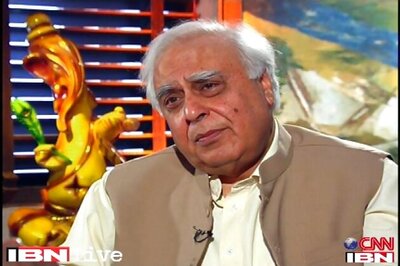
views
Baghdad: In a world sharply divided on Iraq since the US-led war began in 2003, Saddam Hussein's death sentence on Sunday unleashed fears of fresh violence and new questions about the fairness and impartiality of the tribunal that ordered him to hang.
Underscoring the fault lines that split the international community and widened the divide between Muslims and Christians, Islamic leaders warned that the verdict could inflame those who revile the US – undermining US policy in the volatile Middle East and inspiring terrorists to strike.
Critics accused President Bush of timing the sentence just two days before Tuesday's pivotal midterm elections, where Democrats are fighting to regain control of Congress.
''The hanging of Saddam Hussein will turn to hell for the Americans,'' said Vitaya Wisethrat, a respected Muslim cleric in Thailand, where Islamic insurgency is raging in the country's south.
''The Saddam case is not a Muslim problem but the problem of America and its domestic politics,'' he said.
''The Americans are about to vote in a midterm election, so may be Bush will use this case to tell the voters that Saddam is dead and that the Americans are safe. But actually the American people will be in more danger with the death of Saddam.''
In Pakistan, the opposition religious coalition claimed American forces have caused more deaths in Iraq during the past three and half years than Saddam during his 23-year reign, and insisted Bush should stand trial for war crimes.
''Who will punish the Americans and their lackeys who have killed many more people than Saddam Hussein?'' asked Hafiz Hussain Ahmed, a senior lawmaker from the Mutahida Majlis-e-Amal coalition, which is critical of Pakistan's military cooperation with the US.
''What goes around comes around in the future, Bush must face the same fate,'' Ahmed said.
Reaction was mixed across the Arab world. Some Muslims saw the sentence as divine justice, but others denounced it as a farce, maintaining that Iraq is more violent now than it was under Saddam.
''If Saddam is condemned to death, then they must make it fair and sentence Bush to death and they should send Israel's Ehud Olmert to death, too, because of what he did in Lebanon,'' said Ibrahim Hreish, a jeweler in Amman, Jordan.
But Sunday's verdict, which had been widely expected, was welcomed by key US allies, who said Saddam got what he deserved for crimes against humanity committed during years of brutal dictatorship.
PAGE_BREAK
''Appalling crimes were committed by Saddam Hussein's regime. It is right that those accused of such crimes against the Iraqi people should face Iraqi justice,'' British Foreign Secretary Margaret Beckett said in a statement.
Australia's foreign minister, Alexander Downer, called Saddam ''an evil tyrant'' and said the death sentence, which will be subject to an automatic appeal before he can be hanged came as no surprise.
Amnesty International questioned the fairness of the trial, and international legal experts said Saddam should be kept alive long enough to answer for other atrocities. Only then, they said, will Iraqis brutalized by years of his despotic rule see true justice done.
''The longer we can keep Saddam alive, the longer the tribunal can have to explore some of the other crimes involving hundreds of thousands of Iraqis,'' said Sonya Sceats, an international law expert at the Chatham House foreign affairs think tank in London.
''The problem really is that this tribunal has not shown itself to be fair and impartial not only by international standards, but by Iraqi standards. There is significant evidence of political pressure,'' she said.
Chandra Muzaffar, president of the Malaysian-based International Movement for a Just World, also voiced concerns that Saddam's trial was flawed because it ''violated many established norms of international jurisprudence, such as in the way the court was constituted and how the charges were brought against Saddam.''
''But Saddam was undoubtedly a brutal dictator, and even though I wouldn't subscribe to the death penalty, he deserves to be punished severely for the enormity of his crimes,'' said Chandra, a well-known Muslim social commentator.
Chandra said there was bound to be a violent reaction in Iraq.
Underlining the volatility, Iraqi President Jalal Talabani said in Paris that he thought the trial was fair but refused to elaborate, fearing his remarks could inflame tensions.
In Russia, the Kremlin-allied head of the international affairs committee in the State Duma, or lower house of parliament, told Ekho Moskvy radio the sentence will deepen divisions in Iraq.
But the official, Konstantin Kosachyov, said he doubted that Saddam would actually be executed.
''A death sentence will apparently split Iraqi society even further,'' Kosachyov said. ''On the other hand, it seems to me that the death sentence against Saddam Hussein will probably not be carried out. It will be stopped one way or another, either by the president of Iraq or by other means.
It is most of all a moral decision retribution that modern Iraq is taking against Saddam's regime.''
Swedish Foreign Minister Carl Bildt called the verdict ''deeply satisfying'' despite Europe's opposition to the death penalty, but he stressed that it won't solve Iraq's problems.



















Comments
0 comment